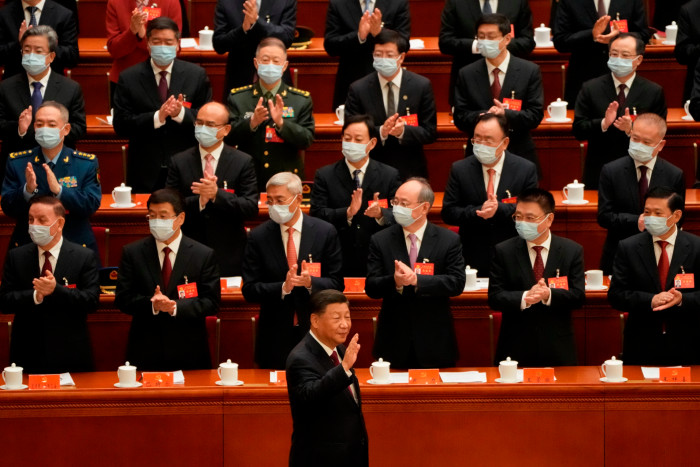[ad_1]
Deng Xiaoping ushered capitalism into Communist China with his famous aphorism: “Let some get wealthy first.” Four decades later, Xi Jinping is deciding “how rich is too rich”?
China is preparing for an abrupt end to years of growth spurred by investment and exports. The slowdown is being exacerbated by the contentious zero-Covid policy, a snowballing property sector crisis and the choking of its access to vital technologies by the Biden administration.
As growth slows there are rising expectations that Xi will sharpen focus on redistribution to improve the living standards for large swaths of the country’s 1.4bn people.
In his opening address to the Chinese Communist party’s quinquennial congress on Sunday, Xi lambasted the party elite for “hedonism” and “extravagance” while promising oversight of “the means of accumulating wealth” and “excessive incomes”.
The remarks reignited sensitive debates about the wisdom of Xi’s economic policies and the uneasy relationship between the ruling party and the businesses that underpin growth in the world’s second-largest economy.

Contentious questions include whether China should pursue a “people-oriented economy”, meaning a state-led, self-reliant and patriotic economy, but also Xi’s sweeping “common prosperity” vision aimed at reducing social inequality and cracking down on cultural vice as well as reining in big business and the excesses of China’s ultra wealthy.
“Can the Chinese problem be solved by relying solely on theories brought in from the west? I’m afraid not. But can China’s problems be solved only by Chinese theories? This will be an even bigger mistake,” said Wang Xiaolu, vice-director at the National Economic Research Institute, a Beijing-based independent think-tank, in a recent interview with Chinese financial media.
“People-oriented” and “people-first” are appearing more frequently in official statements, including by the People’s Bank of China and the ministry of finance. The phrasing, which has its roots among Chinese scholars and the party leadership in the early 1950s, describes a path of development distinct from western capitalist systems.
In the weeks leading up to the party congress, Wen Tiejun, a 71-year-old agricultural economist at Renmin University, promoted the concept. Wen suggested that the Chinese economy was meant to serve sovereignty, develop independently and be pushed forward by state-led conglomerates.
Transcripts of Wen’s statements circulated widely through WeChat messaging groups, China’s biggest social media platform, until censors removed the content days before the congress.
The comments, however, have become a proxy for concern over the sidelining of market-oriented reforms as Xi embarks on an unprecedented third term as China’s leader.
“Marketisation is an inescapable process of human development. We should cherish but not resist the technological wealth, ideological wealth and institutional wealth shared among mankind,” Wang said.
Xiang Songzuo, head of the Shenzhen-based Greater Bay Area Financial Research Institute, said Wen’s promotion of the “people-oriented” theory was “not in line with the historical development of other countries, nor in line with the experience of China’s reform and opening up over the past 40 years”.
“It’s really deceiving the people in the name of the people,” he said of Wen’s theory.
Xi on Sunday reaffirmed that economic development was a priority for China. But he also targeted security and a “people-first” agenda.
He reiterated that both state-owned and private businesses were vital, and that the party should show “unswerving” support for the latter, striking a more balanced tone than many analysts expected.
Still, his use of “people-oriented” stirred anxiety among reformists as concerns mount over the vast economic challenges facing the president and his economic planners.
Xiang warned that the popularity of Wen’s statement reflected a “psychosocial imbalance” between different social camps, rooted in “the hatred of the rich”.
“The nation has yet formed respect for individual rights, especially private property rights . . . The more difficulties the Chinese economy is facing, the more we must use the greatest courage to promote ‘reform and opening’,” he said, referring to Deng’s hallmark policy that transformed China.
Among the more important guidelines from the party congress are Xi’s plans to step up industrial policy with more fiscal support and subsidies, to achieve self-sufficiency, a greater focus on national security and the concentration of the state’s role in the economy, noted analysis by Natixis.
“This implies that the role of private companies may become subdued,” said Alicia Garcia Herrero, chief Asia-Pacific economist at the French bank. She added that state companies might also need to do more and earn less to shoulder their social responsibilities.
Christopher Marquis, an expert on the Chinese economy at Cambridge Judge Business School, said the “mechanisms” of achieving wealth distribution had to be considered carefully to ensure that “the high-end productive and innovative part of the economy isn’t killed by the redistribution”.
“The principle of trying to spread the economic success China had over the past 40 years to less developed cities and rural areas is in theory a good strategy,” added Marquis. “But as I’ve seen how it’s implemented, it’s very heavy-handed towards the rich.”
Additional reporting by William Langley in Hong Kong
[ad_2]
Source link

